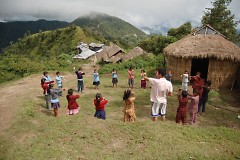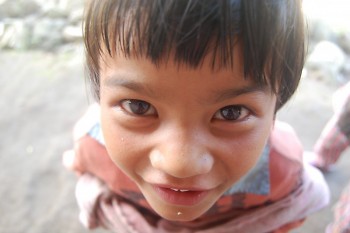
Students learn basic skills at MUA's Chisapani campus /Maya Universe Academy

Student at MUA's Chisapani campus /Maya Universe Academy

Students learn basic skills at MUA's Chisapani campus /Maya Universe Academy

Student at MUA's Chisapani campus /Maya Universe Academy
In the United States, it’s easy to see how education can be taken for granted. Elementary and secondary schooling are required, and attending college is normative in many communities. It’s considered something of a social taboo if someone cannot read and write.
But in rural Nepal, illiteracy runs rampant. Current and former Calvin students have started the grassroots schooling system Maya Universe Academy (MUA) to combat rural Nepal's lack of quality education.
According to Shin Chul Yoon, a former Calvin student and one of MUA's founders, the academy is a community not only of students and teachers, but also of “farmers, artists and lovers” who work together to provide quality education at no cost to the students.
The idea for the academy was born out of a clear need, one that Yoon and his fellow founders (who affectionately call themselves “Mayans”) saw occur cyclically in rural Nepal.
According to Yoon, the education system in Nepal has been monopolized by the government and for-profit private institutions, neither of which are viable options for rural Nepalese students.
“The country has little hope in government schools, as they are inefficient, ill managed and corrupt, similar to the government that runs them, while entrepreneurs are motivated by profits and do not cater to the needs of poor families,” said Yoon.
Yoon explained that the government’s poor schools mean that impoverished Nepalese have little opportunity for post-primary schooling, and little opportunity to escape from the poverty they were born into.
“In 2011, while 90 percent of students from private schools were admitted to secondary education, the majority of students from government schools had no chance of higher education,” said Yoon. “This cannot only be the fault of the students.”
According to Yoon and his colleagues, the lack of quality education is a primary cause of the widespread poverty in Nepal.
“Until the problem of unequal and incomplete education is tackled head on, NGOs, local government assistance and countless foreign aid will not rescue the country from its poverty,” said Yoon.
What originally began as a few individuals attempting to teach a few undereducated Nepalese children the basic concepts of language and math has transformed into a rapidly expanding organization throughout the country.
The original plan was to enroll 10 students in this free yet private academy in 2011. But nearly 200 families showed up to apply at the original campus in the Tanahun district of Nepal, leading to rapid expansion.
The founders of MUA quickly realized the amount of resources that would be needed in order to effectively teach their students, and they began branching out into the community for cooperation. Families would commit to volunteering two days a month in return for education. The families that participated in the academy helped create a separate, self-sufficient community in the rural village of Udhin Dhunga, producing their own food, educating each other and learning new and more efficient ways of healing and farming.
In early 2011, MUA launched a second campus, located in the rural village of Chisapani, a small village on the ridge of a Himalayan foothill. Currently there are 26 students learning science, math, Nepali, English and social studies, according to the MUA website.
MUA also has a recently opened third campus in the Syangja district of Nepal, further northwest than either of the previous campuses.
Current Calvin students Min Lim and Max Kwon sit on the MUA’s Board of Directors and aid in representing the organization in the U.S. Both students also donate to the school and do what they can to help the academy from a distance.
“I use a lot of what I learn in my business classes at Calvin to take care of and look over some of the finances for the school,” said Lim.
Lim encourages Calvin students and community members to get involved in any number of ways.
“Even just introducing people to the website brings more awareness,” said Lim, “and volunteers at the schools are always welcome.”
Lim suggests that prospective volunteers consider options such as spending a summer or semester at a MUA campus, and he points to the website as the easiest way to inquire about such opportunities (mayauniverseacademy.org).
Lim and Yoon both stress that this project was started by ordinary people with a drive to help others in need, and that anybody can get involved if they are willing.
“We are just people who are willing to love others as ourselves,” said Yoon.
“I know people who are majoring in subjects like sociology or international development that are passionate about spending their lives helping people,” added Lim. “An opportunity like this one offers real experience in fields like that. This is one way that somebody can really live out their faith."
The Rapidian, a program of the 501(c)3 nonprofit Community Media Center, relies on the community’s support to help cover the cost of training reporters and publishing content.
We need your help.
If each of our readers and content creators who values this community platform help support its creation and maintenance, The Rapidian can continue to educate and facilitate a conversation around issues for years to come.
Please support The Rapidian and make a contribution today.